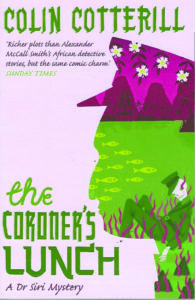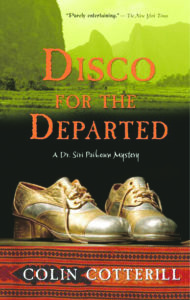By Vikas Datta
 It is far from the smallest nation in Southeast Asia but gets overshadowed by its ASEAN neighbours in both name and fame. However, crime fiction, which has shone the spotlight on countries in Africa’s trackless bush, teeming Latin American tenements, and South Pacific’s scenic but isolated islands, does the same for Laos.
It is far from the smallest nation in Southeast Asia but gets overshadowed by its ASEAN neighbours in both name and fame. However, crime fiction, which has shone the spotlight on countries in Africa’s trackless bush, teeming Latin American tenements, and South Pacific’s scenic but isolated islands, does the same for Laos.
This is courtesy of British-Australian teacher, rights activist, author and cartoonist Colin Cotterill, who, with his Dr Siri series set in Laos of the mid-1970s-early 1980s, evocatively brings out the life, social mores and norms, and politics of this sole landlocked Southeast Asian country.
The time period is equally important in depicting Southeast Asia when it was far from the tourist paradise of today and impacted by superpower rivalry – particularly, Laos, then in the throes of revolutionary change too.
While people usually remember 1970s in Southeast Asia for the Vietnam war – and then the Khmer Rouge’s depredations in Cambodia, Laos was also impacted. Like its eastern neighbour’s Viet Cong, it had a Communist movement (Pathet Lao), also born in France in the 1930s, and active since the end of World War II when colonial ruler France returned to take control. Dragged willy-nilly dragged into the Vietnam conflict, Laos also ended up by turning communist in 1975, like the newly re-united Vietnam – and like it, is still Communist.
This makes an engaging backdrop for the 15 Dr Siri mysteries – where a simple – yet – resilient, mostly peasant people, who hold on to their religious (Buddhism) and folk beliefs – including beliefs in spirits, face a Communist leadership, which seeks transformation on basis of their theories and slogans, and an unenterprising bureaucracy. And then, advisors from fraternal socialist countries – the Soviet Union, but also China – which borders Laos, and of course, Vietnam, play their part.
The hero of the series, which came out regularly once a year from 2004 to 2020 (save in 2012 and 2014) is Siri Paiboun, a septuagenarian but still spry Paris-trained doctor and revolutionary, reluctantly serving as national coroner after the communist takeover.
Cynical, outspoken and irreverent, he also hosts the spirit of a 1,000-year-old shaman, which enables him to see ghosts of the unhappily-departed – but not communicate with them. His unsolicited spirit support also leads to him travel in time and space – mostly in his mind and dreams – where the solution or denouement of the crime before him are reached – thought how exactly only becomes apparent later.
 Along with Dr Siri is his staff of nurse Dtui and oddjob man Geung (who has Down’s syndrome), longtime friend and politburo member Civilai, police inspector Phosy, noodle-seller with a chequered past (and later wife) Madame Daeng, and many others, from a puppet-master to a renegade Buddhist monk to a pair of former prostitutes he shelters in his sprawling official accommodation. And the villains are numerous
Along with Dr Siri is his staff of nurse Dtui and oddjob man Geung (who has Down’s syndrome), longtime friend and politburo member Civilai, police inspector Phosy, noodle-seller with a chequered past (and later wife) Madame Daeng, and many others, from a puppet-master to a renegade Buddhist monk to a pair of former prostitutes he shelters in his sprawling official accommodation. And the villains are numerous
All of the 15 adventures deal with multiple – and artistically convoluted – plots of murder and mayhem, with the last few some seeing most characters separately confronting various arcs, which may or may not converge later on, but are skillfully resolved. Though there is a supernatural element, it is not the cause of crime.
Siri debuts in The Coroner’s Lunch (2004), with his desire to retire now the revolution has succeeded being rudely dashed when he is made coroner, despite no expertise in forensics. But any hope the job may be a sinecure is dashed when he has several mysterious deaths to solve – including some literally out of the world!
Thirty Three Teeth (2005) also has a brace of plots but offsetting its grimness is an episode of superlative satire where local Communist officials seek to impose regulations on the spirit world, while Disco for the Departed (2006) again has all sorts of skulduggery including a touch of voodoo, a Cuban specialist who is not what he seems, while Siri’s boss schemes to remove Geung.
Anarchy and Old Dogs (2007) adds an attempted coup to a spate of unexplained deaths and the unwelcome act of confronting an old friend in the wrong, while The Curse of the Pogo Stick (2008) deals with the plight of the Hmong people, used by Americans as mercenaries in neighbouring Vietnam and then abandoned to their fate.
The Merry Misogynist (2009) is a relatively straightforward race to find a serial killer of young women, but more harrowing is Love Songs from a Shallow Grave (2010) which combines a fiendish triple murder (all women) with a fencing blade while Siri goes missing in Phnom Penh where Khmer Rouge under Brother No.1 (Pol Pot) have begun their reign.
A bruised Siri is then joined by several old associates on an ostensible mission to search for a missing American aviator in Slash and Burn (2011), which seems a send-off but the good doctor however returns in The Woman Who Wouldn’t Die (2013), whose title says it all.
Six and a Half Deadly Sins (2015) sees a fiendish plot being exposed after some mysterious clues make their way to Siri, and force him to visit the country’s north as China invades Vietnam – while he and Civilai fend off a Chinese feint, while I Shot the Buddha (2016) has Siri and Daeng on the trail of Sanghraj (Laos’ Buddhist patriarch) who seems to be defecting to Thailand, while Civilai goes to probe a possible Buddha reincarnation and falls into something more sinister, among more murky happenings.
Siri and some of his friends accompany the Laos team to the boycott-hit Moscow Olympics in The Rat Catchers’ Olympics (2017), but complications arise, Don’t Eat Me (2018) is an early look at the illegal wildlife trade in the region, and The Second Biggest Nothing (2019) sees Siri threatened with murder of his nearest and dearest – and trawls into three episodes from his past – a political assassination in 1930s Paris, an art scam in 1950s colonial Laos, and a POW exchange in Vietnam in the 1970s – to figure who is behind threat. It also sees one of the crew bid goodbye.
The series ends with The Delightful Life of a Suicide Pilot (2020), where the diary of a WWII-era Japanese pilot, sent to Siri, is an elegant yet powerful testimony to the horrors of war and the human mind’s response and how the conflict stretches into the present.
A master blend of varying elements, including the fantastic and political, the series are an unforgettable look into a recent, unsettled past, where most of the appliances we take for granted are not there, and nor are the other certainties! (IANS)



